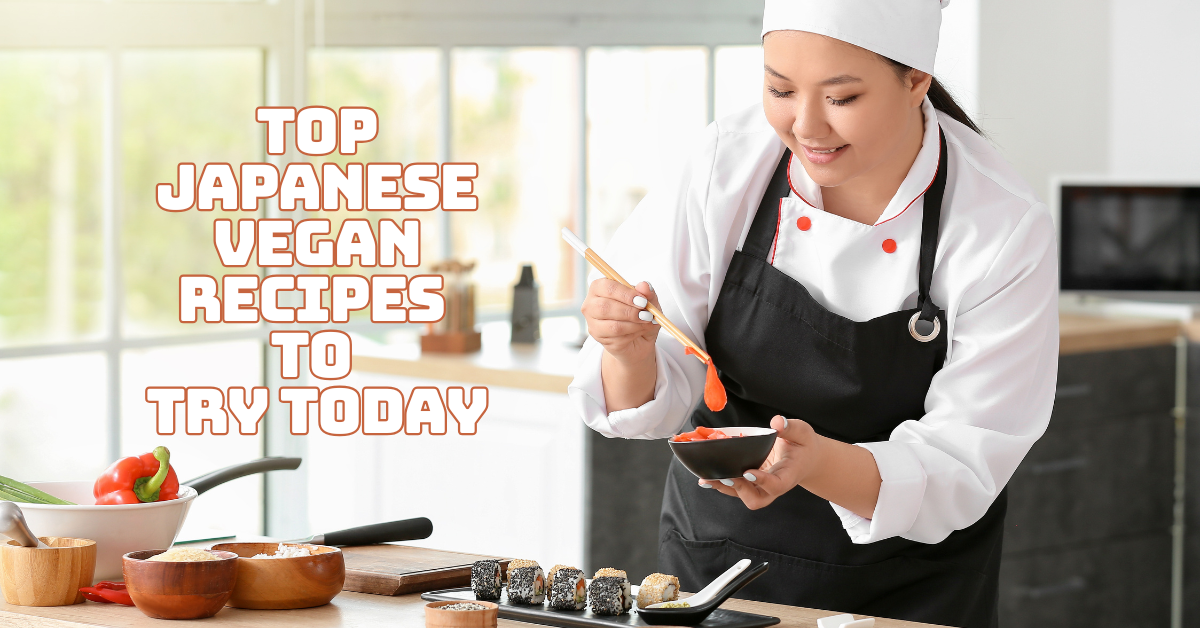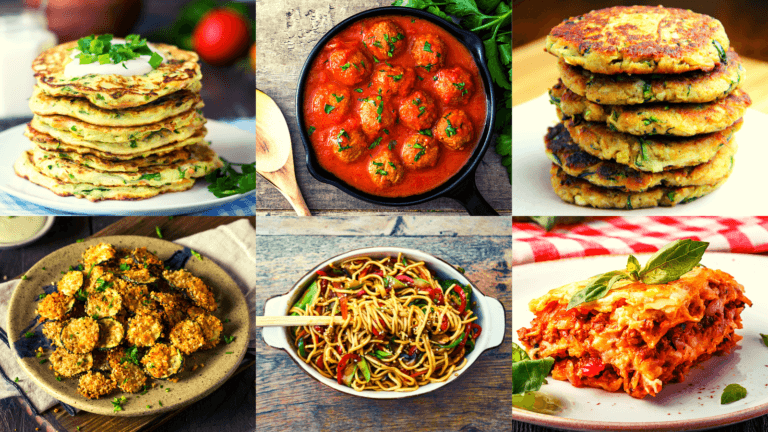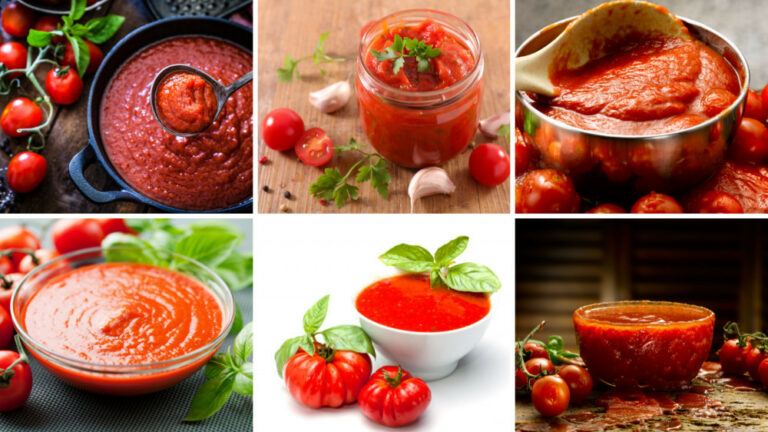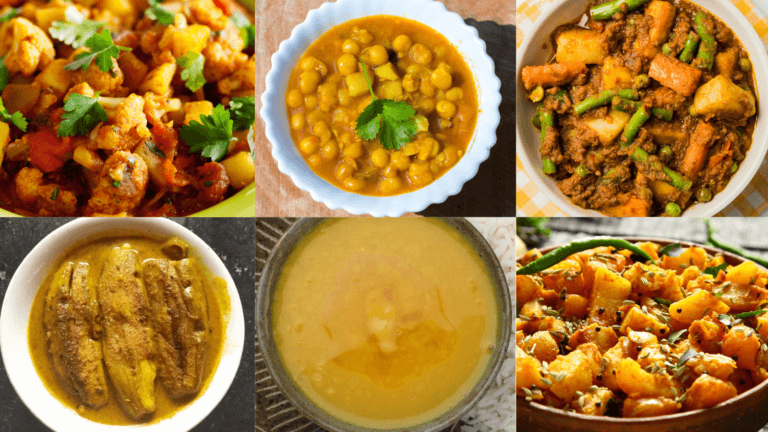Best Japanese Vegan Recipes To Try Today
Explore the rich flavours of Japanese cuisine with a vegan twist! From umami-packed miso soup to savoury vegetable sushi, Japanese vegan recipes combine tradition and innovation.
This guide will introduce you to plant-based versions of classic dishes, celebrating fresh ingredients, unique seasonings, and mindful preparation that make Japanese cooking delicious and wholesome.
Exploring Japanese Vegan Recipes
1. Miso Soup With Tofu And Wakame Recipe
A classic Japanese dish, miso soup is renowned for its simplicity and umami flavour. This vegan version uses kombu-based dashi for the broth and is packed with nutritious ingredients like tofu and seaweed.
Prep time: 10 minutes | Cook time: 10 minutes | Total time: 20 minutes | Servings: 4
Ingredients
- Kombu: 1 piece (about 4 inches)
- Shiitake mushrooms: 3 dried
- Water: 4 cups
- Miso paste: 3 tablespoons
- Tofu: 1 block, cut into cubes
- Wakame seaweed: 2 tablespoons dried
- Scallions: 2, chopped
Method
- To make the vegan dashi broth, simmer kombu and shiitake mushrooms in water for 10 minutes, which promotes their growth. Dissolve miso paste in a small broth, then mix it into the pot.
- Add tofu cubes and wakame, simmering gently for 2-3 minutes.
- Garnish with chopped scallions and serve warm.
Nutrition Facts Of Miso Soup With Tofu And Wakame (per serving)
Calories: 90 kcal | Protein: 7g | Fat: 3g | Carbohydrates: 8g | Sodium: 380mg
Health Benefits Of Miso Soup With Tofu And Wakame
Miso soup is rich in probiotics from miso, which promote gut health and boost immunity. Wakame seaweed provides iodine for thyroid function, while tofu offers plant-based protein, supporting muscle health. Low-calorie and nutrient-dense, it's a wholesome choice.
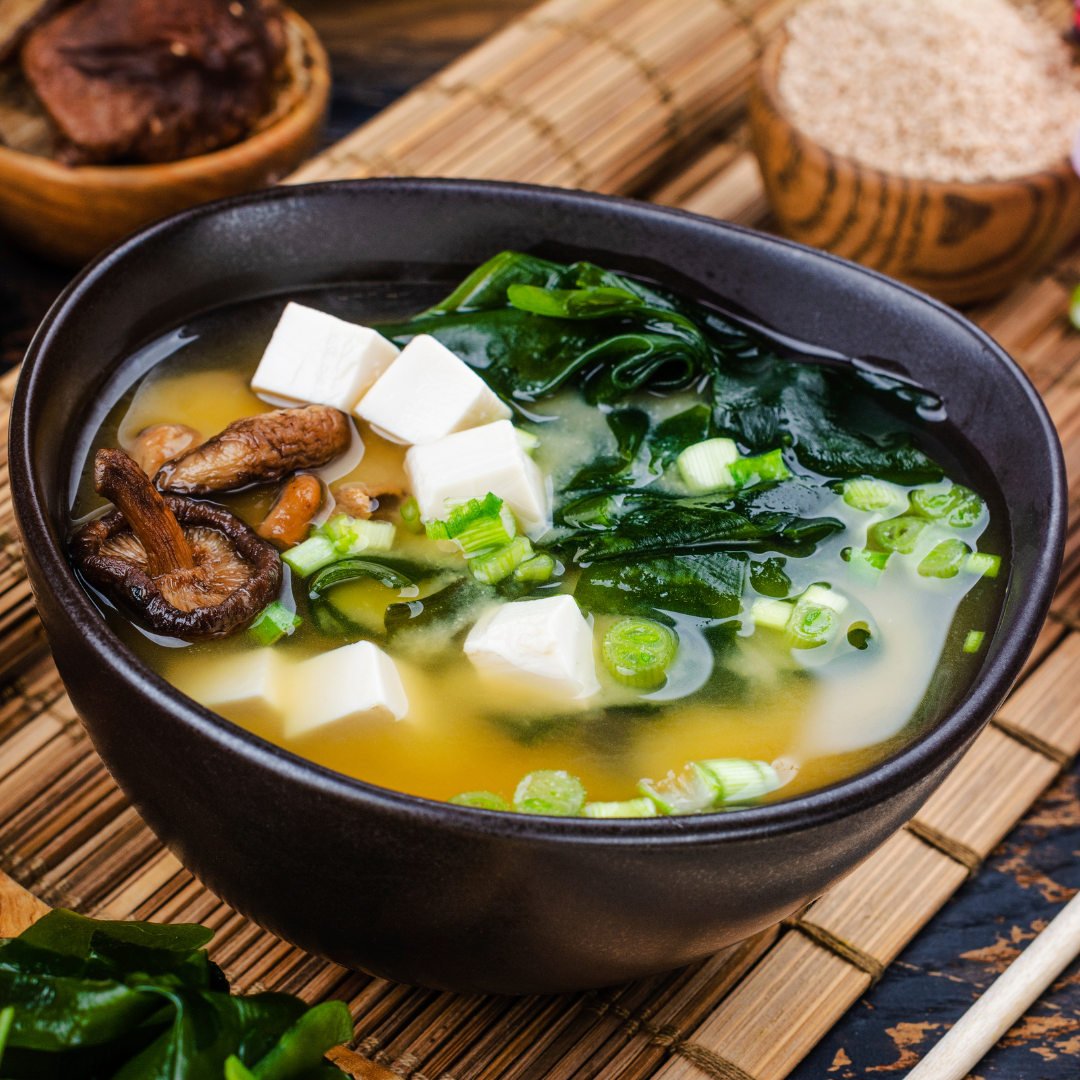
2. Vegan Sushi Rolls Recipe
Sushi rolls are a staple in Japanese vegan recipes. They offer vibrant, nutritious, and flavourful options for a satisfying snack or light meal.
Prep time: 30 minutes | Cook time: 20 minutes | Total time: 50 minutes | Servings: 4
Ingredients
- Sushi rice: 2 cups, cooked
- Rice vinegar: 3 tablespoons
- Nori: 4 sheets
- Avocado: 1, sliced
- Cucumber: 1, julienned
- Carrot: 1, julienned
- Soy sauce for dipping
Method
- Mix rice vinegar with cooked sushi rice and let it cool.
- Lay a nori sheet on a bamboo rolling mat. Evenly distribute a thin layer of rice on top of it, leaving a 1-inch border at the top.
- Layer avocado, cucumber, and carrot strips horizontally on the rice.
- Roll tightly using the mat, slice into pieces, and serve with soy sauce.
Nutrition Facts Of Vegan Sushi Rolls (per serving)
Calories: 200 kcal | Protein: 4g | | Carbohydrates: 32g | Sodium: 200mg
Health Benefits Of Vegan Sushi Rolls
Vegan sushi rolls are low in fat and rich in fiber, aiding digestion. Avocado provides heart-healthy fats, while carrots and cucumbers are packed with vitamins and antioxidants that support immunity and skin health. A nutrient-packed, guilt-free snack!
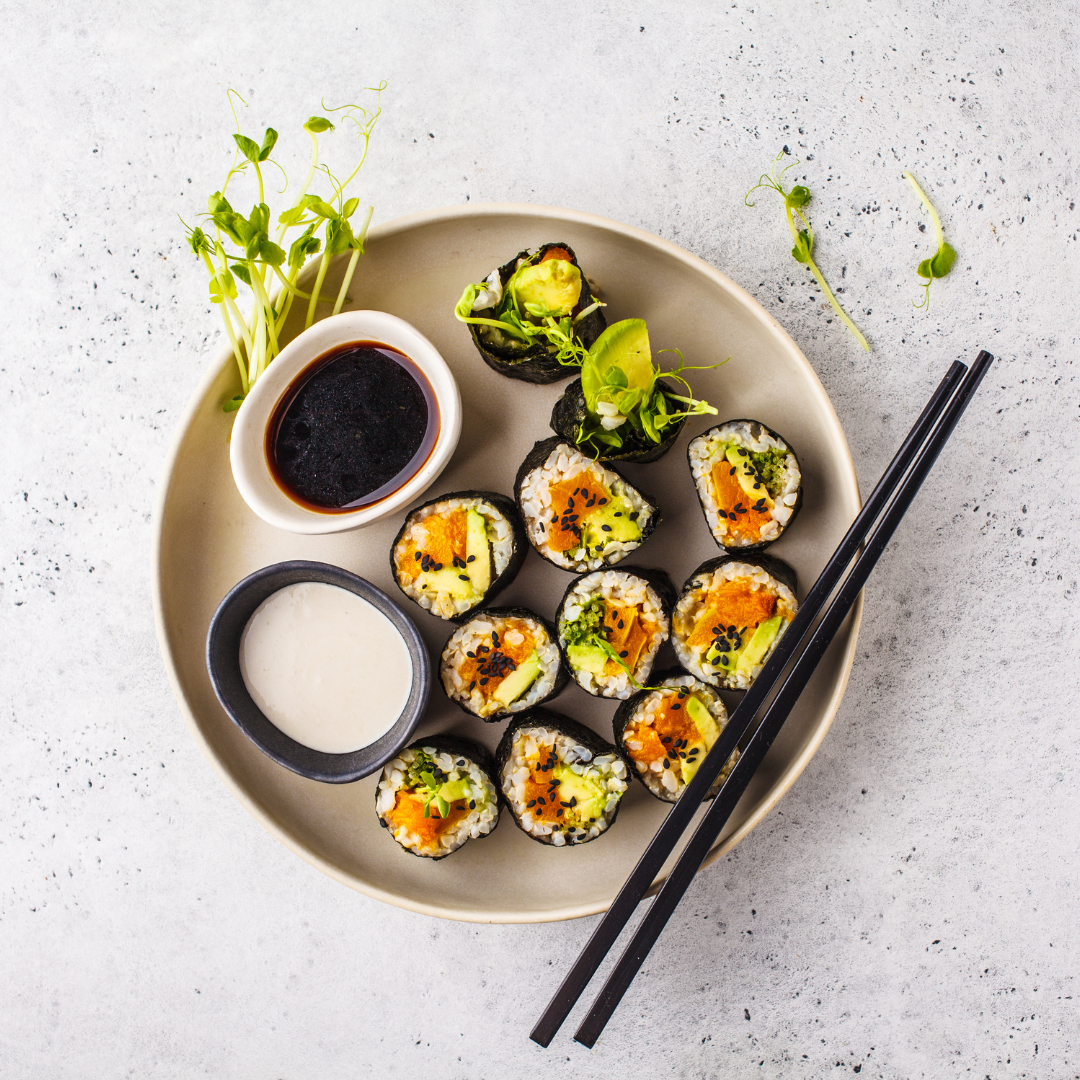
3. Vegan Ramen Recipe
This plant-based ramen is a hearty, satisfying meal. It features a rich broth and a variety of fresh toppings.
Prep time: 15 minutes | Cook time: 25 minutes | Total time: 40 minutes | Servings: 4
Ingredients
- Udon noodles: 8 oz
- Kombu: 1 piece (4 inches)
- Shiitake mushrooms: 3dried
- Soy sauce: 3 tablespoons
- Miso paste: 2 tablespoons
- Bok choy: 1 head, chopped
- Corn: ½ cup
- Tofu: 1 block, pan-fried
Method
- Prepare the broth by simmering kombu and shiitake mushrooms in water for 15 minutes. Remove solids.
- Add soy sauce and miso paste, stirring until dissolved.
- Divide the noodles among bowls and cook them as directed on the package.
- Top with bok choy, corn, tofu, and pour over the hot broth.
Nutrition Facts Of Vegan Ramen (per serving)
Calories: 350 kcal | Protein: 15g | Carbohydrates: 55g | Sodium: 600
Health Benefits Of Vegan Ramen
Vegan ramen offers protein from tofu, fiber from bok choy, and vitamins from corn. Kombu broth adds iodine for thyroid health, while miso's probiotics support gut health, creating a hearty, wholesome meal.

4. Vegan Gyoza (Dumplings) Recipe
These crispy, pan-fried dumplings, filled with savoury vegetable filling, are perfect for appetizers or snacks.
Prep time: 20 minutes | Cook time: 15 minutes | Total time: 35 minutes | Servings: 4
Ingredients
- Dumpling wrappers: 20 (check for egg-free)
- Cabbage: 1 cup, finely chopped
- Carrot: 1, grated
- Mushrooms: ½ cup, minced
- Garlic: 2 cloves, minced
- Soy sauce: 2 tablespoons
Method
- Sauté cabbage, carrot, mushrooms, and garlic in a pan with soy sauce until softened. Let it cool.
- Place a small spoonful of filling in each wrapper, and fold and seal the edges.
- Pan-fry dumplings in some oil until golden, then steam for 2-3 minutes.
- Serve with a soy-vinegar dipping sauce.
Nutrition Facts Of Vegan Gyoza (Dumplings) (per serving)
Calories: 220 kcal | Protein: 6g | Fat: 3g | Carbohydrates: 40g | Sodium: 400mg
Health Benefits Of Vegan Gyoza (Dumplings)
Vegan gyoza combines cabbage, carrots, and mushrooms for vitamins A and C, boosting immunity and skin health. Antioxidant-rich and nutrient-packed, these dumplings are a delicious, plant-based Japanese treat.
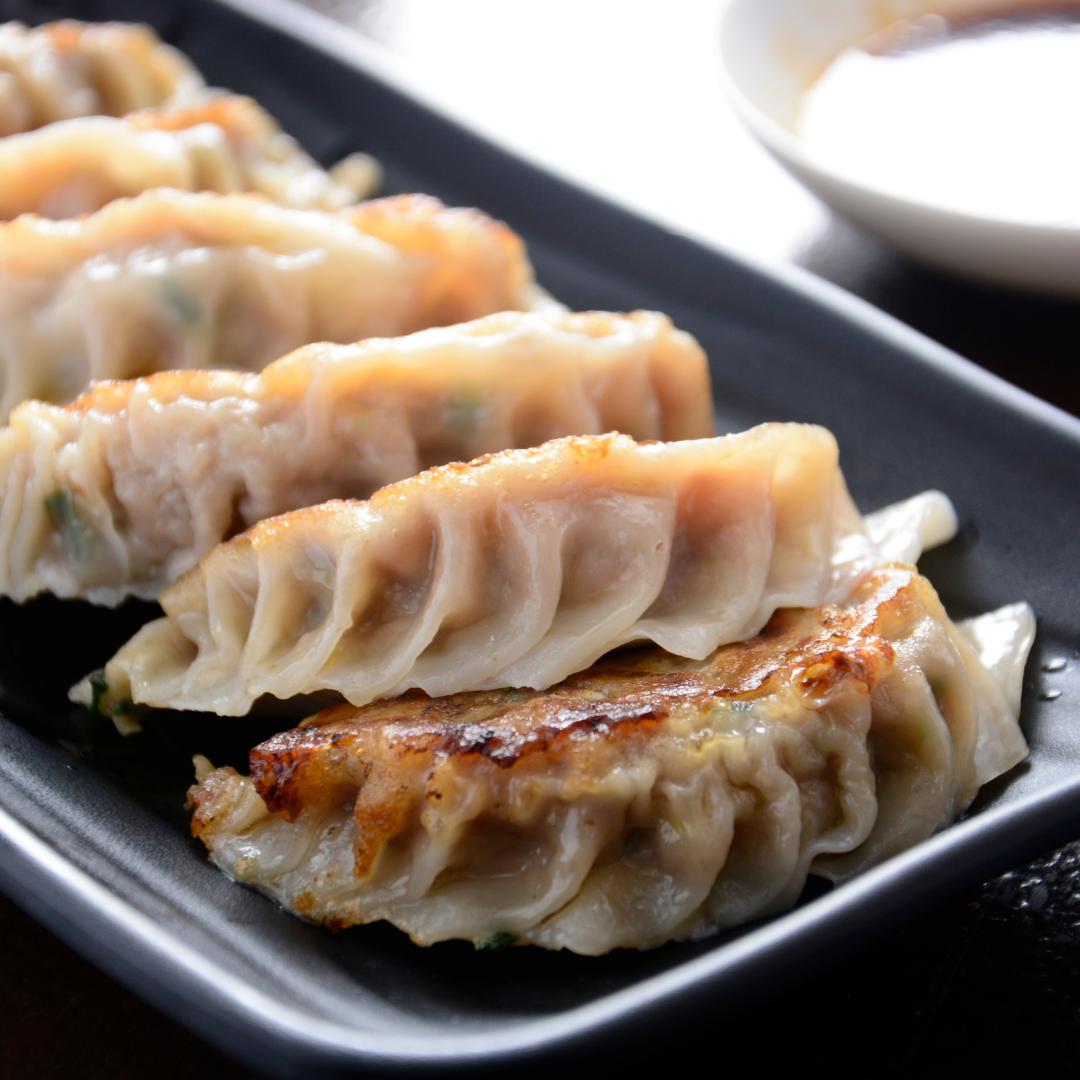
5. Japanese Vegan Matcha Mochi Recipe
This chewy, sweet dessert infused with matcha green tea is a delightful way to end a Japanese meal.
Prep time: 10 minutes | Cook time: 15 minutes | Total time: 25 minutes | Servings: 6
Ingredients
- Glutinous rice flour: 1 cup
- Sugar: ¼ cup
- Water: ¾ cup
- Matcha powder: 1 teaspoon
Method
- Mix rice flour, sugar, matcha powder, and water into a smooth batter.
- Steam the batter f. It's 10-12 minutes, stirring halfway through, which.
- Once cooked, knead the dough slightly, then shape into small balls or cubes.
- Dust with additional matcha powder or cornstarch to prevent sticking.
Nutrition Facts Of Japanese Vegan Matcha Mochi (per serving)
Calories: 140 kcal | Protein: 1g | Fat: 0g | Carbohydrates: 32g | Sodium: 5mg
Health Benefits Of Japanese Vegan Matcha Mochi
Matcha mochi offers a sweet treat with the added benefits of matcha, which is rich in antioxidants, like catechins, which support heart health and reduce inflammation. It's a guilt-free dessert option, being fat-free and cholesterol-free.
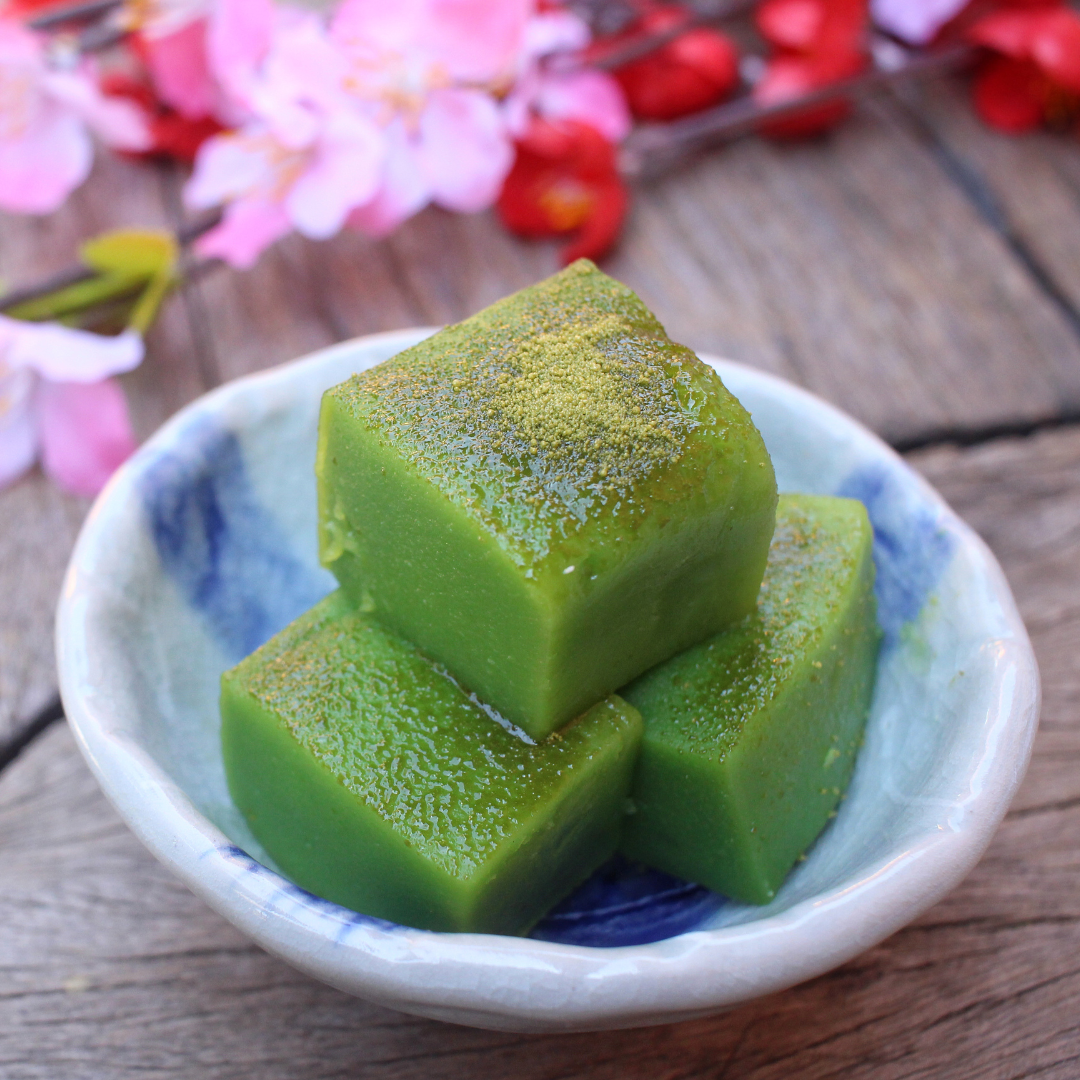
6. Japanese Pickled Vegetables (Tsukemono) Recipe
Tsukemono, or Japanese pickled vegetables, are a tangy, flavourful side dish often served with rice or as a palate cleanser.
Prep time: 10 minutes | Rest time: 1-2 hours | Total time: 2 hours 10 minutes | Servings: 4
Ingredients
- Daikon radish: 1 small, thinly sliced
- Cucumber: 1, sliced
- Carrot: 1, julienned
- Rice vinegar: ¼ cup
- Sugar: 2 tablespoons
- Sea salt: 1 teaspoon
Method
- Dissolve the salt, sugar, and vinegar in a basin.
- Combine vegetables in a container, pour the pickling liquid, and mix well.
- Press the vegetables with a plate or a small weight, and refrigerate for 1-2 hours.
- Serve cold as a garnish or as a side dish.
Nutrition Facts Of Japanese Pickled Vegetables (Tsukemono) (per serving)
Calories: 35 kcal | Protein: 1g | Fat: 0g | Carbohydrates: 8g | Sodium: 200mg
Health Benefits Of Japanese Pickled Vegetables (Tsukemono)
Japanese pickled vegetables are a staple in Japanese vegan recipes. They offer probiotics, essential vitamins, and minerals while supporting digestion and balanced blood sugar levels with their low-calorie, nutrient-rich profile.
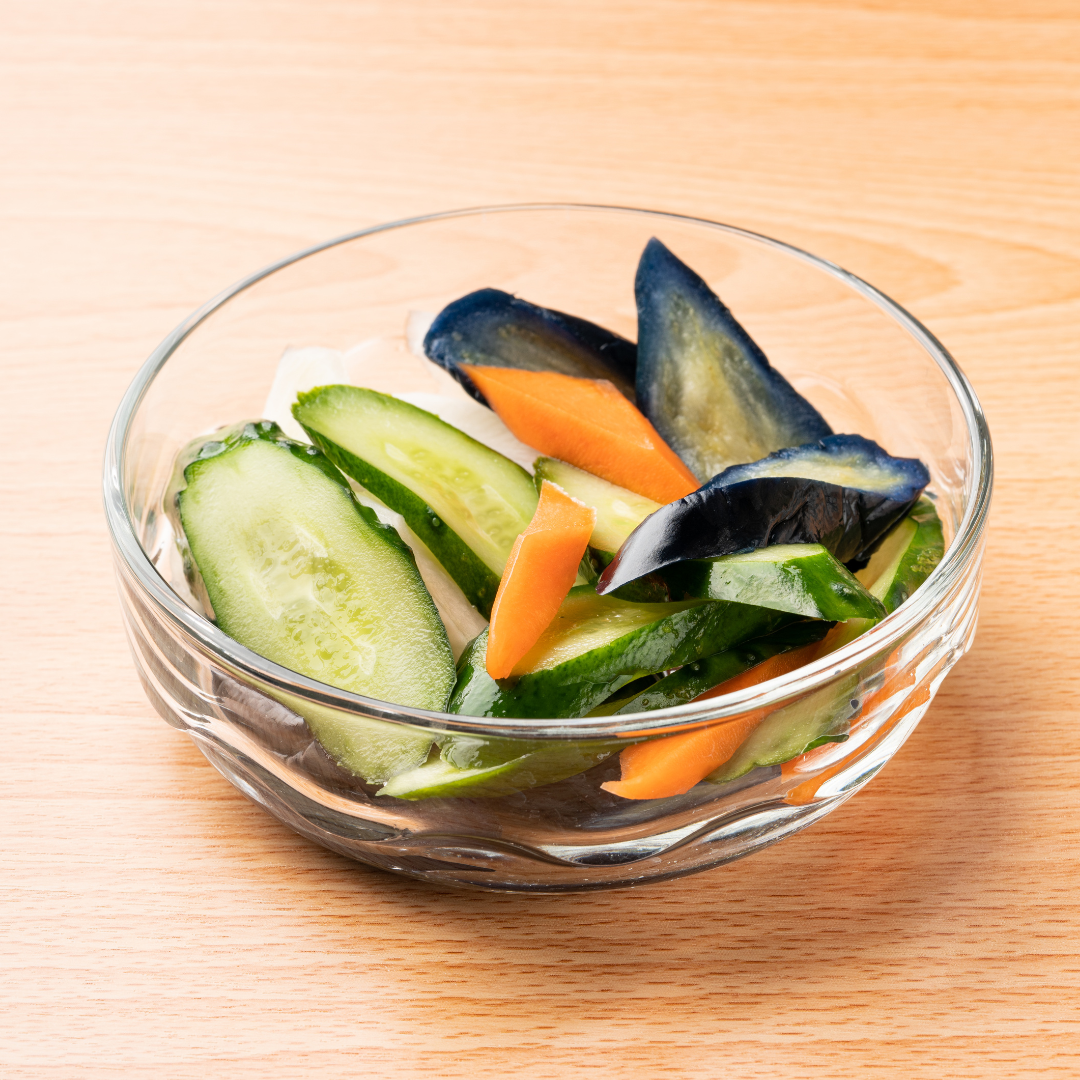
7. Japanese Vegan Teriyaki Eggplant Recipe
This eggplant with a sweet and savoury teriyaki sauce is excellent as a side dish or served over rice.
Prep time: 10 minutes | Cook time: 15 minutes | Total time: 25 minutes | Servings: 4
Ingredients
- Eggplants: 2 medium, sliced lengthwise
- Soy sauce: ¼ cup
- Mirin: 2 tablespoons
- Sugar: 1 tablespoon
- Cornstarch: 1 teaspoon, mixed with 2 teaspoons of water
Method
- Pan-fry the eggplant slices until golden and tender.
- Bring the soy sauce, mirin, and sugar to a boil in a small saucepan.
- To thicken the sauce, stir in the cornstarch slurry.
- Pour the teriyaki sauce over the eggplant and serve with rice or noodles.
Nutrition Facts Of Japanese Vegan Teriyaki Eggplant (per serving)
Calories: 120 kcal | Protein: 2g | Fat: 4g | Carbohydrates: 18g | Sodium: 450mg
Health Benefits Of Japanese Vegan Teriyaki Eggplant
Teriyaki eggplant is rich in antioxidants like nasunin, supporting brain and heart health. Its fiber and umami-packed, low-fat teriyaki sauce make it a flavourful, wholesome highlight of Japanese vegan cuisine.
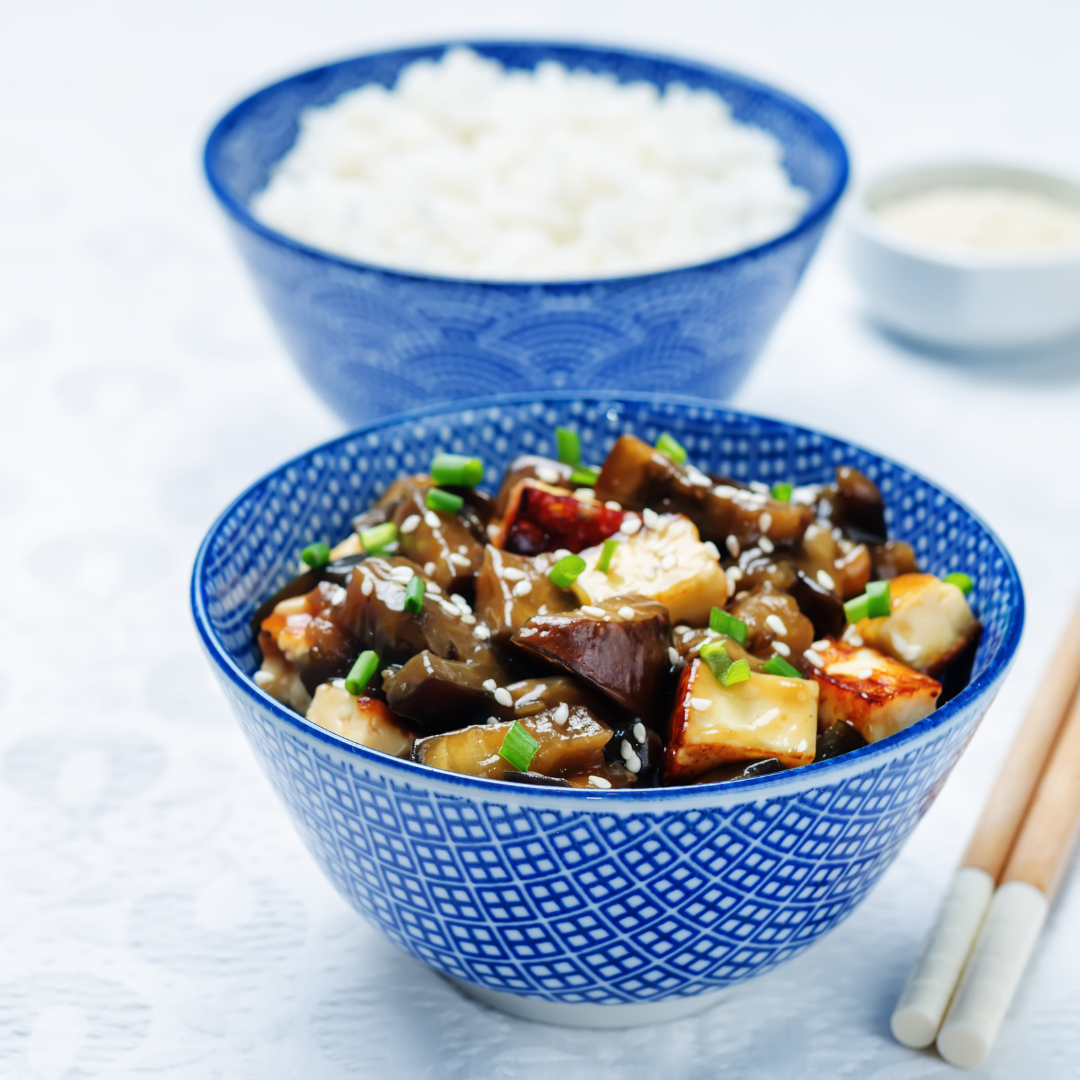
8. Japanese Spinach Salad (Goma-ae) Recipe
This simple yet delicious salad features spinach dressed in a nutty sesame sauce.
Prep time: 10 minutes | Cook time: 5 minutes | Total time: 15 minutes | Servings: 4
Ingredients
- Spinach: 1 bunch, washed and trimmed
- Sesame seeds: 2 tablespoons toasted
- Soy sauce: 2 teaspoons
- Sugar: 1 teaspoon
- Mirin: 1 teaspoon
Method
- Chill the spinach in ice water after blanching in boiling water for 1 to 2 minutes. After squeezing out any extra water, cut it into quarters.
- Get the sesame seeds ground in a mortar and pestle.
- Then, combine them with sugar, mirin, and soy sauce to make a dressing.
- Toss spinach with the sesame dressing and serve.
Nutrition Facts Of Japanese Spinach Salad (Goma-ae) (per serving)
Calories: 60 kcal | Protein: 3g | Fat: 3g | Carbohydrates: 5g | Sodium: 240mg
Health Benefits Of Japanese Spinach Salad (Goma-ae)
Japanese spinach salad provides iron, calcium, and vitamins A and C to support strong bones and immunity. Sesame seeds add healthy fats and antioxidants, supporting heart health and reducing inflammation.
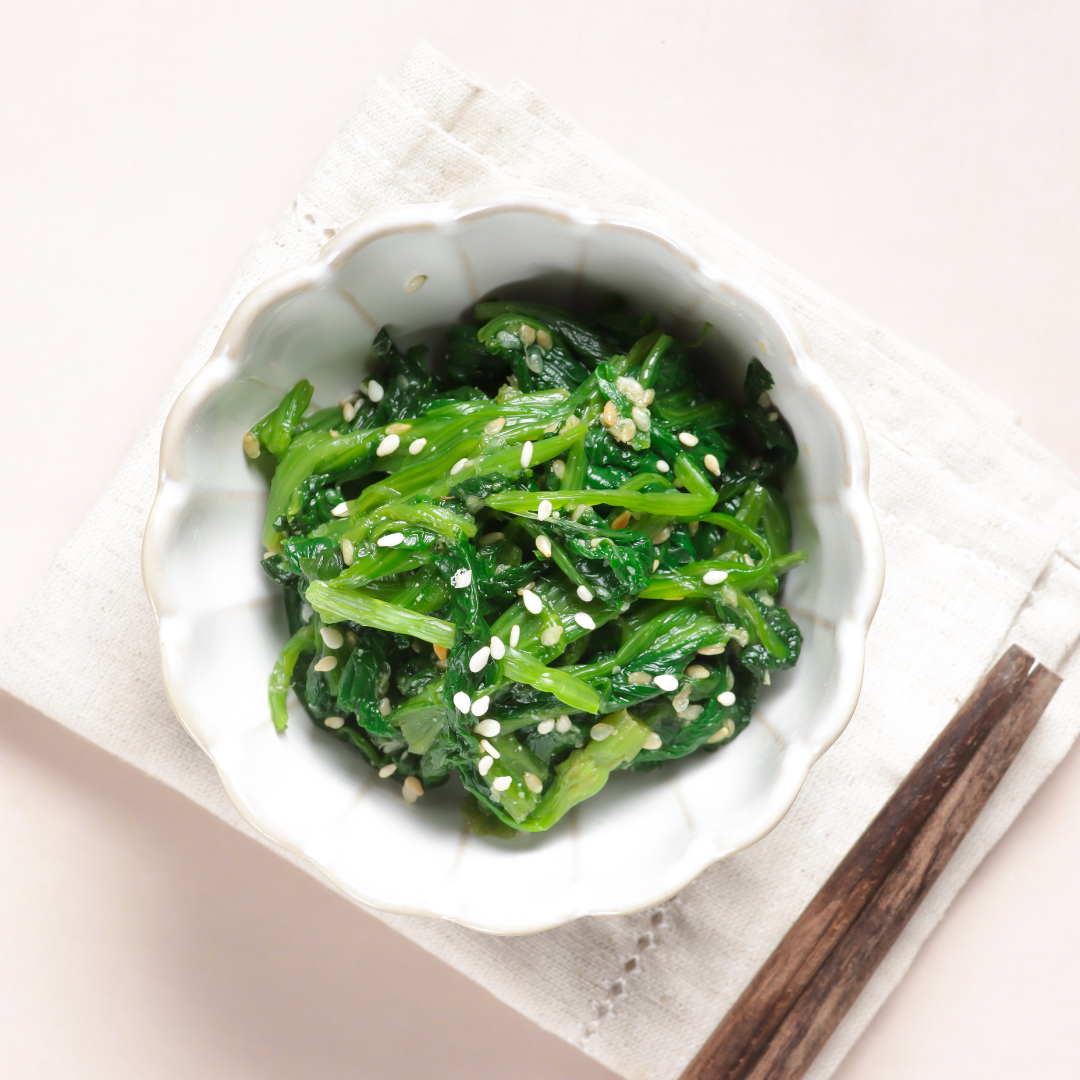
9. Vegan Okonomiyaki Recipe
Okonomiyaki, or Japanese pancakes, are packed with vegetables and topped with flavourful sauces.
Prep time: 15 minutes | Cook time: 10 minutes | Total time: 25 minutes | Servings: 4
Ingredients
- All-purpose flour: 1 cup
- Water: ¾ cup
- Cabbage: 2 cups, shredded
- Carrot: 1, grated
- Green onion: 2, chopped
- Vegan mayo: for topping
- Okonomiyaki sauce: for topping
Method
- Mix flour and water to form a batter, then fold in vegetables.
- Cook the batter in pancake-sized amounts in a heated nonstick skillet until it turns brown on both sides.
- Top with vegan mayo and okonomiyaki sauce before serving.
Nutrition Facts Of Vegan Okonomiyaki (per serving)
- Calories: 200 kcal
- Protein: 4g
- Fat: 6g
- Carbohydrates: 32g
- Sodium: 450mg
Health Benefits Of Vegan Okonomiyaki
Vegan okonomiyaki combines fibre-rich cabbage and carrots for immunity and digestion with balanced carbs, protein, and fats for sustained energy. Green onions add antioxidants, making it a satisfying, healthful meal.
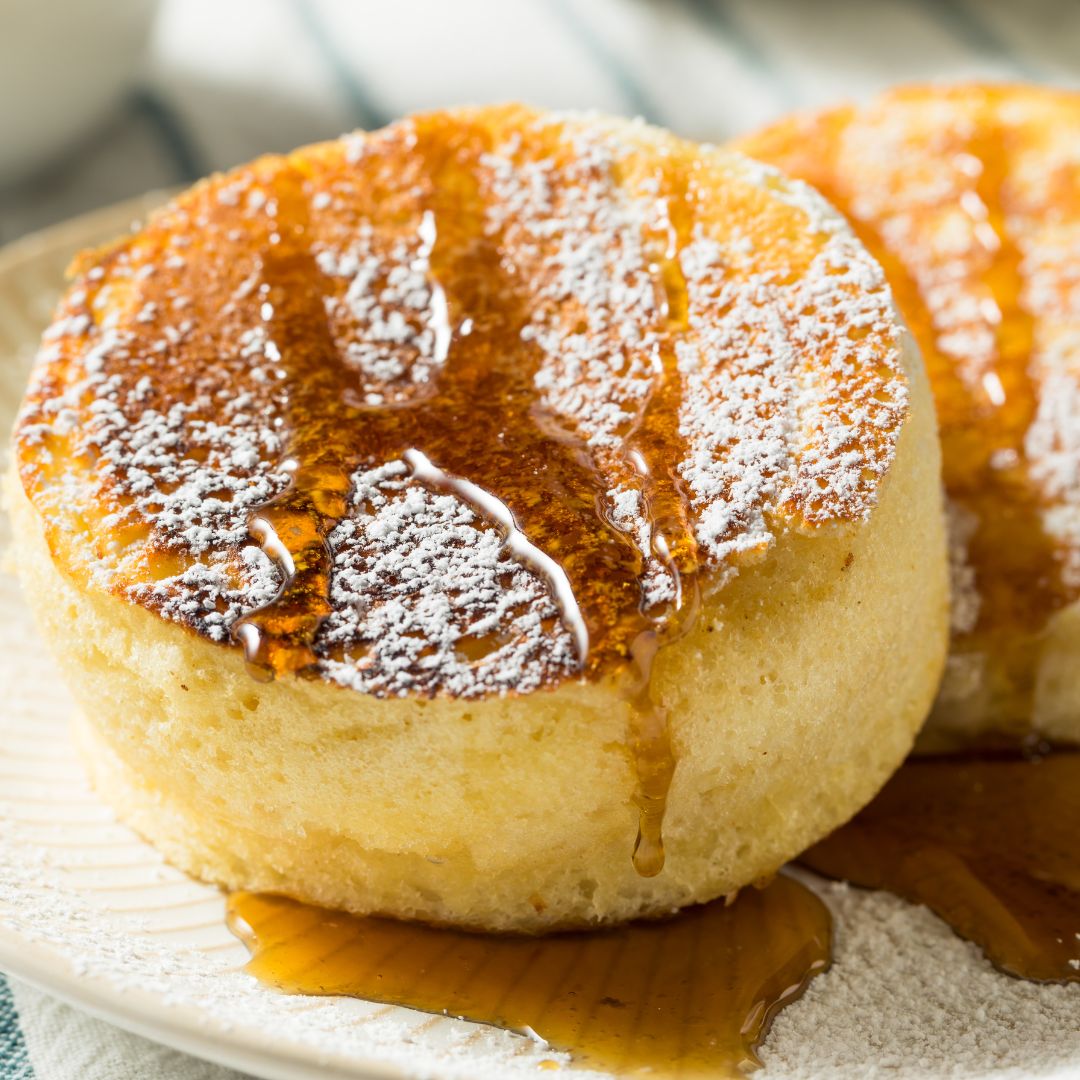
10. Onigiri (Rice Balls) Recipe
Onigiri, a beloved option in Japanese vegan recipes, features rice shaped into triangles or balls filled with savoury plant-based ingredients.
Prep time: 15 minutes | Cook time: 20 minutes | Total time: 35 minutes | Servings: 4
Ingredients
- Sushi rice: 2 cups, cooked
- Umeboshi (pickled plum): 4, pitted
- Nori: 4 sheets, cut into strips
- Sea salt to taste
Method
- Wet your hands, sprinkle with salt, and shape the rice into a ball or triangle.
- Press a piece of umeboshi into the center of each rice ball and seal it with more rice.
- Serve after wrapping in a strip of nori.
Nutrition Facts Of Onigiri (Rice Balls) (per serving)
Calories: 180 kcal | Protein: 4g | Fat: 1g | Carbohydrates: 39g | Sodium: 150mg
Health Benefits Of Onigiri (Rice Balls)
Onigiri's carbohydrate-rich rice base provides a quick energy boost. Umeboshi adds probiotics and antioxidants that support gut health and immunity. Low in fat, it’s a light yet filling snack perfect for on-the-go nourishment.
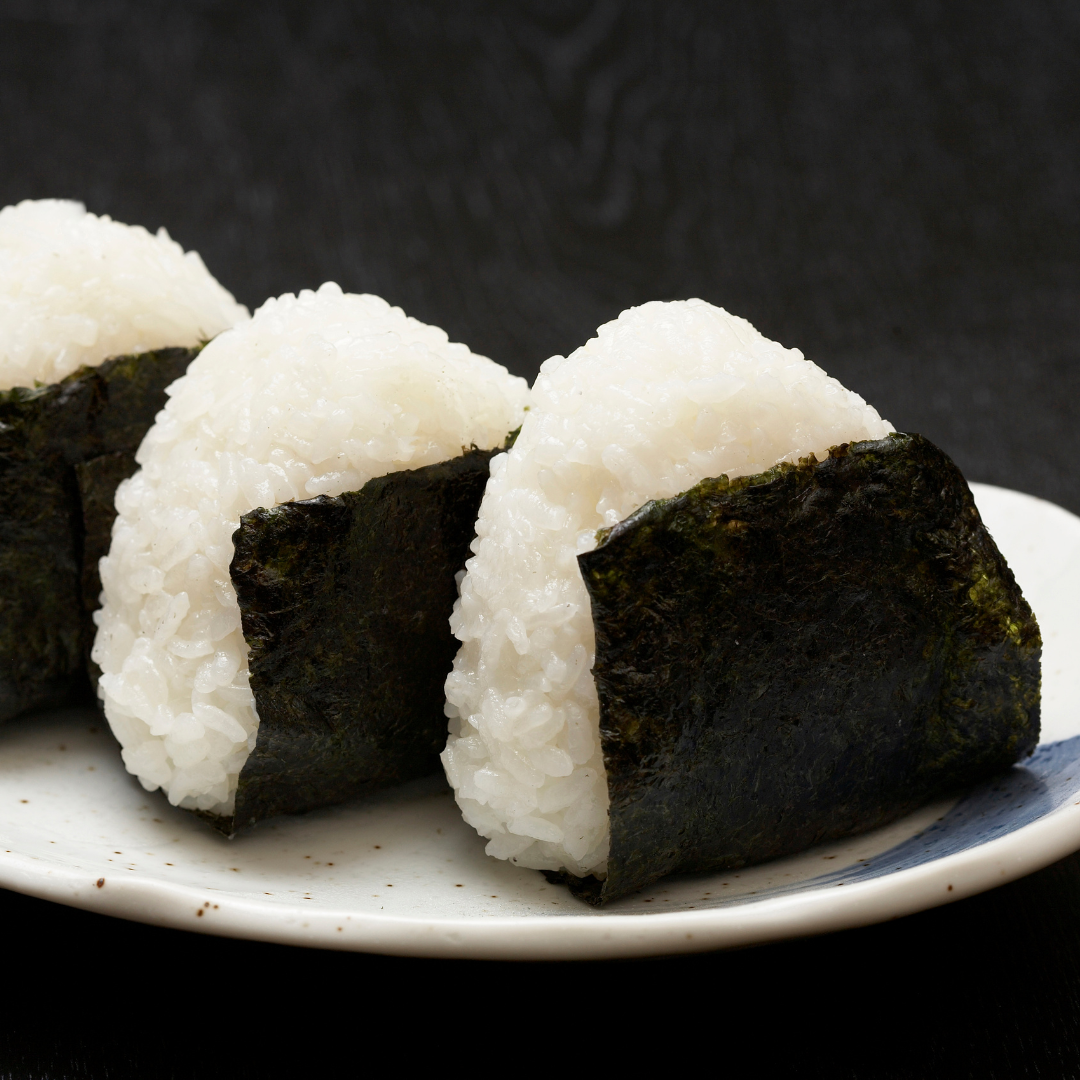
11. Japanese Potato Croquettes (Korokke) Recipe
Korokke are crispy on the outside and soft on the inside, making them a comforting vegan treat.
Prep time: 20 minutes | Cook time: 15 minutes | Total time: 35 minutes | Servings: 4
Ingredients
- Potatoes: 3 large, boiled and mashed
- Onion: 1 small, finely chopped
- Panko breadcrumbs: 1 cup
- All-purpose flour: 1/2 cup
- Plant-based milk: 1/2 cup
- Vegetable oil for frying
Method
- Sauté the onions until softened, then mix them with the mashed potatoes.
- Shape the mixture into patties.
- Coat each patty in flour, dip it in plant-based milk, and cover it with breadcrumbs.
- Fry until golden brown and crispy.
Nutrition Facts Of Japanese Potato Croquettes (Korokke) (per serving)
Calories: 280 kcal | Protein: 4g | Fat: 12g | Carbohydrates: 42g | Sodium: 400mg
Health Benefits Of Japanese Potato Croquettes (Korokke)
Korokke, a vegan Japanese croquette, provides energy-boosting carbs, fiber for digestion, and antioxidants from onions. A satisfying snack that, in moderation, supports overall wellness and a balanced diet.

12. Cold Soba Noodle Salad Recipe
This excellent noodle salad is ideal for a quick and nutritious supper.
Prep time: 15 minutes | Cook time: 5 minutes | Total time: 20 minutes | Servings: 4
Ingredients
- Soba noodles: 250g, cooked and chilled
- Cucumber: 1, julienned
- Carrot: 1, julienned
- Sesame seeds: 2 tablespoons toasted
- Soy sauce: 2 tablespoons
- Rice vinegar: 1 tablespoon
- Sesame oil: 1 teaspoon
Method
- Toss soba noodles with cucumber, carrot, and sesame seeds.
- To dress, combine rice vinegar, sesame oil, and soy sauce.
- Over the noodles, pour the dressing and toss to mix.
- Top with additional sesame seeds and serve cold.
Nutrition Facts Of Cold Soba Noodle Salad (per serving)
Calories: 220 kcal | Protein: 7g | Fat: 9g | Carbohydrates: 28g | Sodium: 600mg
Health Benefits Of Cold Soba Noodle Salad
Cold soba noodle salad offers fiber, antioxidants, and gluten-free carbs. Packed with sesame oil and seeds, it aids digestion, boosts immunity, and supports heart health for a balanced meal.
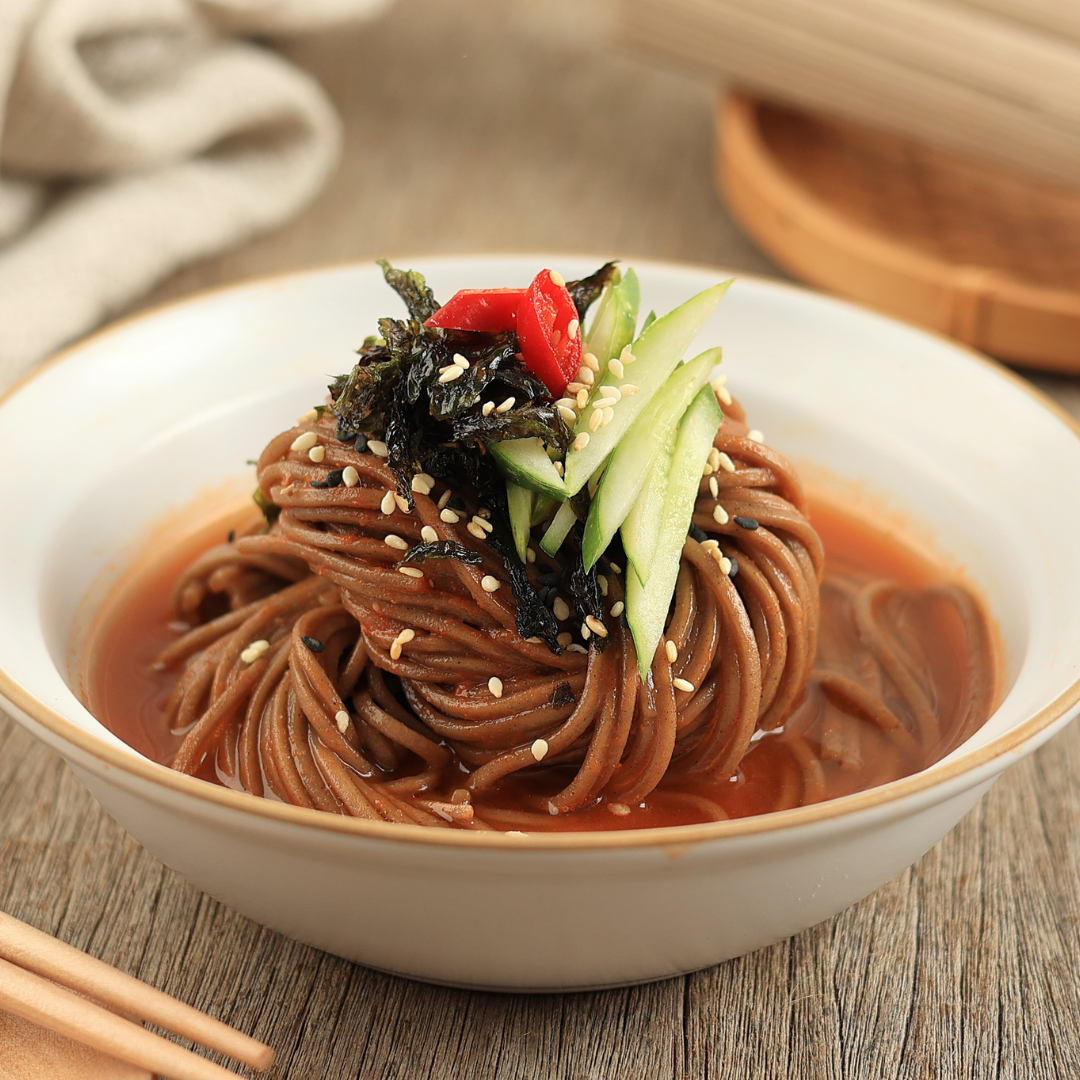
13. Matcha Soy Milk Latte Recipe
This creamy, antioxidant-rich latte is a delightful way to enjoy the health benefits of matcha.
Prep time: 5 minutes | Cook time: 5 minutes | Total time: 10 minutes | Servings: 2
Ingredients
- Matcha powder: 1 teaspoon
- Hot water: 1/4 cup
- Soy milk: 2 cups, heated
- Maple syrup: 1 teaspoon
Method
- Add boiling water to matcha powder and whisk until smooth.
- Heat soy milk and foam if desired.
- Combine the matcha mixture with soy milk and sweeten with maple syrup.
- Serve warm or over ice.
Nutrition Facts Of Matcha Soy Milk Latte (per serving)
Calories: 120 kcal | Protein: 4g | Fat: 5g | Carbohydrates: 14g | Sodium: 100mg
Health Benefits Of Matcha Soy Milk Latte
A matcha soy milk latte offers antioxidants that reduce inflammation, promote heart health, and provide steady energy. Soy milk also adds bone health benefits, making it a nutritious, balanced beverage choice.
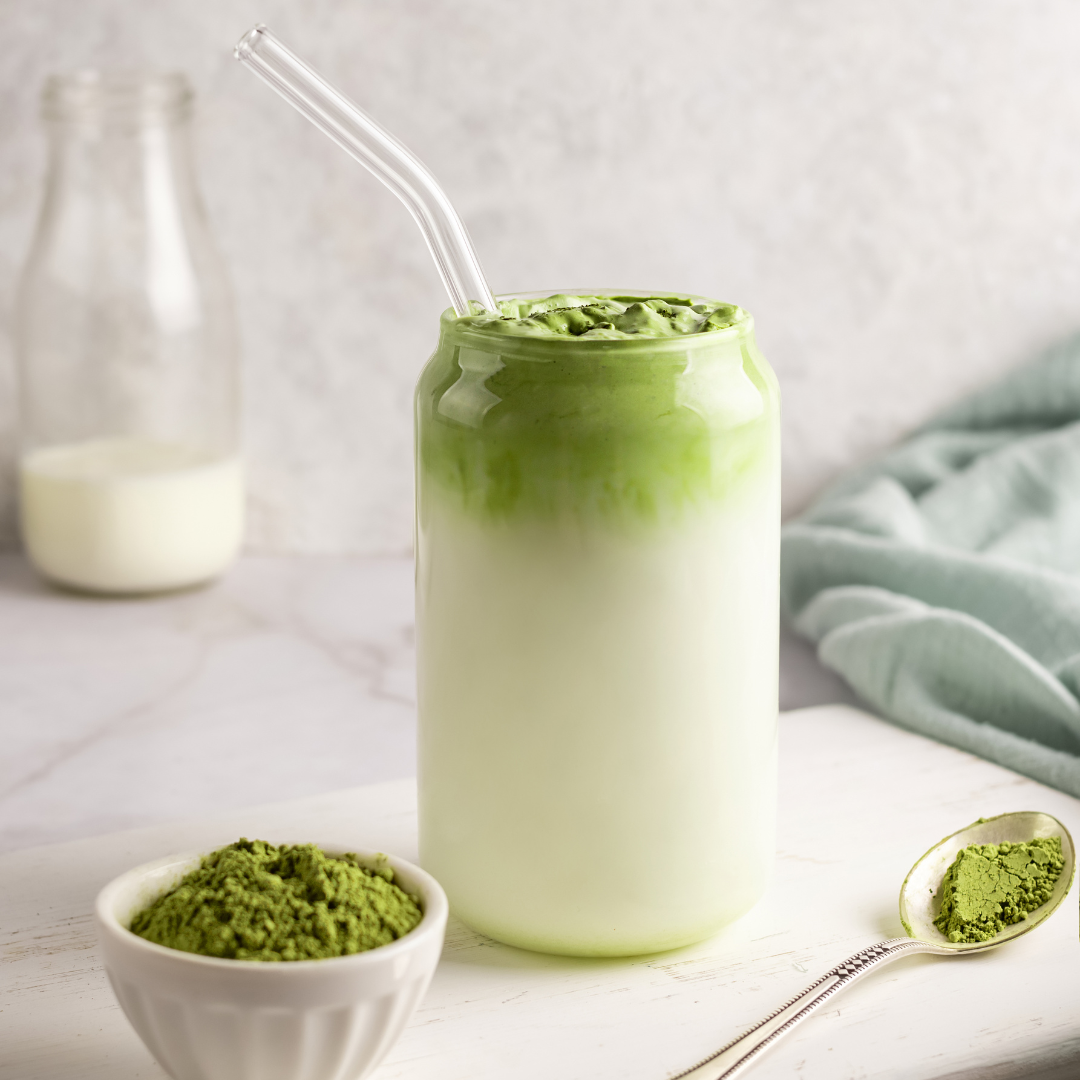
14. Vegan Udon Soup Recipe
A comforting noodle soup with a flavorful broth and fresh vegetables.
Prep time: 10 minutes | Cook time: 15 minutes | Total time: 25 minutes | Servings: 4
Ingredients
- Udon noodles: 250g, cooked
- Kombu (seaweed): 1 sheet
- Shiitake mushrooms: 1/2 cup, sliced
- Soy sauce: 2 tbsp
- Spinach: 1 cup
- Green onions: for garnish
Method
- Simmer kombu and shiitake mushrooms in 4 cups of water for 10 minutes, then remove the kombu.
- Add soy sauce to the broth.
- Combine cooked udon noodles, spinach, and broth in bowls.
- Garnish with green onions and serve hot.
Nutrition Facts Of Vegan Udon Soup (per serving)
Calories: 220 kcal | Protein: 8g | Fat: 2g | Carbohydrates: 42g | Sodium: 450mg
Health Benefits Of Vegan Udon Soup
This soup is packed with fiber for improved digestion. It also features seaweed, rich in iodine, which supports thyroid function and overall metabolism and has antioxidants that promote cellular health.
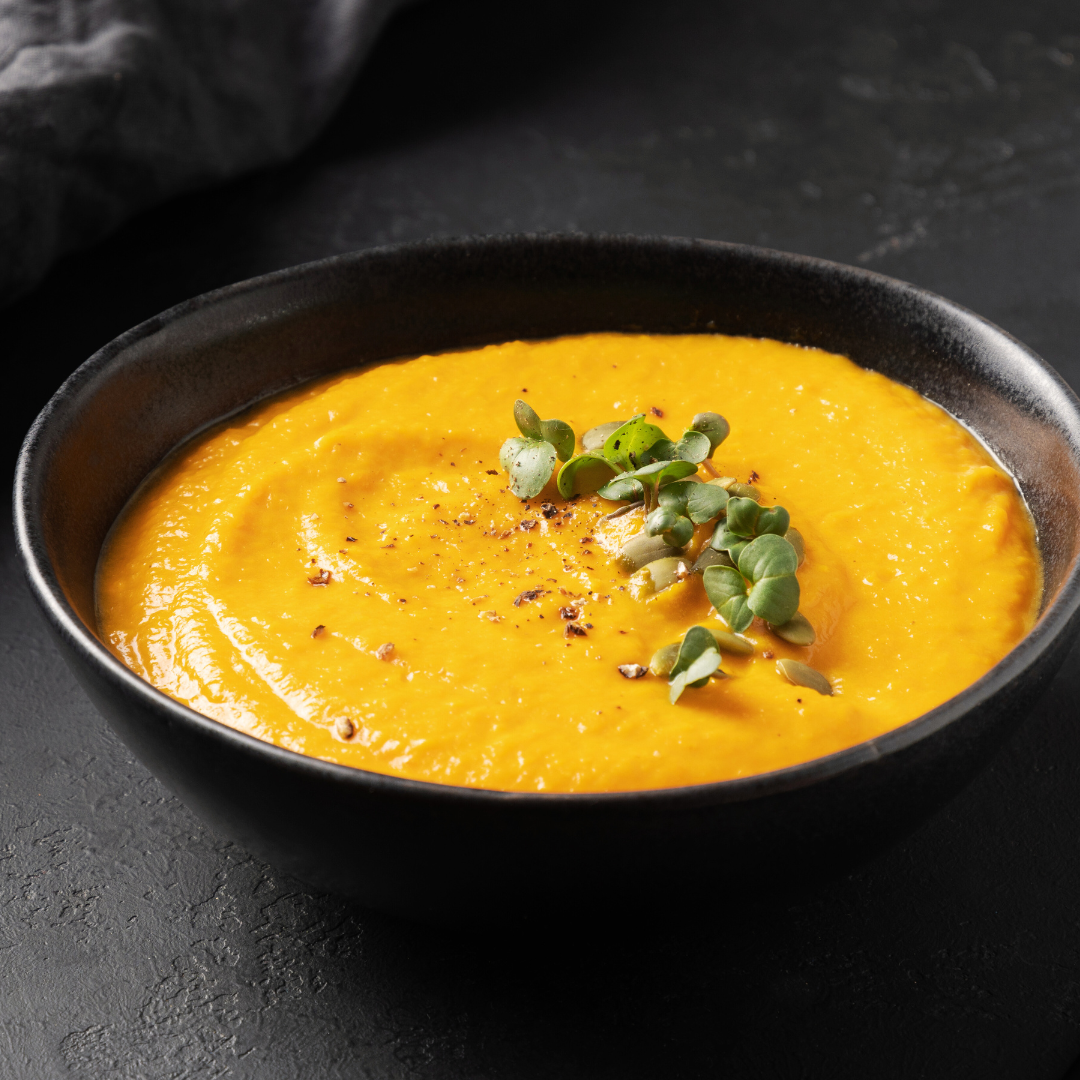
15. Edamame Hummus Recipe
A creamy and vibrant twist on classic hummus, made with protein-rich edamame.
Prep Time: 10 minutes | Cook Time: 5 minutes | Total Time: 15 minutes | Servings: 4
Ingredients
- Edamame (shelled): 1 cup, boiled
- Tahini: 2 tbsp
- Garlic: 1 clove
- Lemon juice: 2 tbsp
- Olive oil: 2 tbsp
- Soy sauce: 1 tsp
Method
- Blend edamame, tahini, garlic, lemon juice, and soy sauce in a food processor until smooth.
- Gradually add olive oil while blending to achieve a creamy consistency.
- Serve with vegetable sticks, crackers, or as a spread.
Nutrition Facts Of Edamame Hummus (Per Serving)
120 kcal, 6g protein, 8g fat (1g saturated), 7g carbs, 2g fiber, 1g sugar, 140mg sodium, 10% DV iron, 5% DV calcium.
Health Benefits Of Edamame Hummus
With protein and antioxidants, edamame aids muscle repair, boosts immunity, and promotes satiety. Tahini contributes healthy fats, supporting heart health and brain function, while garlic enhances immune defence.
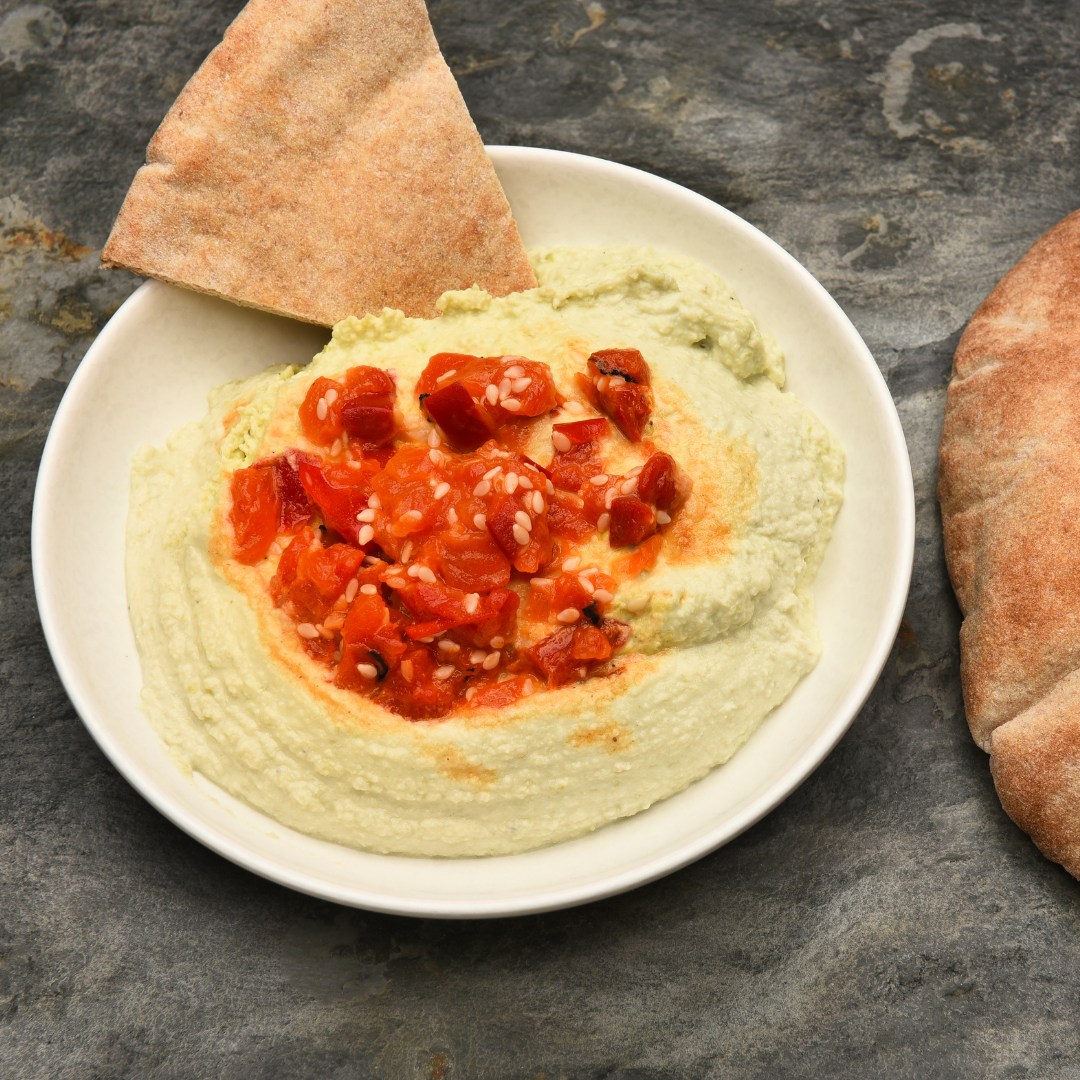
FAQs
Q1: Are Traditional Japanese Dishes Vegan?
Many traditional dishes contain meat or fish, but vegan-friendly options include miso soup, veggie sushi, and tofu dishes. Recipes can be easily modified.
Q2: Where Can I Find Vegan Japanese Ingredients?
Look for vegan Japanese ingredients at local Asian grocery stores or health food stores. Many online retailers also offer specialty items like vegan miso, seaweed, and tofu. Always check the labels to ensure no animal-derived products are included.
Conclusion
Japanese vegan recipes offer a delightful fusion of flavour, tradition, and health. By embracing plant-based ingredients, you can enjoy the essence of Japanese cuisine while supporting a sustainable lifestyle.
Whether it is soup, sushi rolls, or noodle bowls, these recipes bring harmony to your table and inspire mindful, flavourful eating. Start exploring today!
I trust you enjoyed this article on the Best Japanese Vegan Recipes To Try Today. Please stay tuned for more plant-based recipes, vegan travel tips, and lifestyle inspiration.
Take care!
— JeannetteZ 🌿
💬 Your Opinion Is Important To Me
Do you have thoughts, ideas, or questions? I’d love to hear from you. Please leave your comments below, or email me directly at Jeannette@LivingTheVeganLifestyle.org.
📚 More Vegan Lifestyle Reads
🌱 My #1 Recommendation for Online Success
Sharing my passion for vegan living — from food to fashion — has been such a rewarding journey.
If you’ve ever dreamed of building your own ethical lifestyle brand or blog, this is the best place to start.
🌟 See How Vegan Bloggers Build Online Income — Try WA Free (No Credit Card Needed)
Disclosure
This post may contain affiliate links. As an Amazon Associate and participant in other affiliate programs, I earn from qualifying purchases at no extra cost to you. Please read my full affiliate disclosure.

